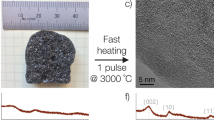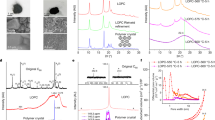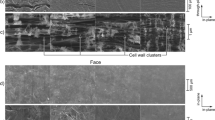Abstract
IT has previously been shown that, in the so-called amorphous carbons, a part of the carbon is organized in small graphite-like layers, and a part is in a form so disordered that it gives only a gas-like scattering of X-rays. Furthermore, of the graphite-like layers, some are stacked in small parallel groups with a characteristic interlayer spacing, while others are effectively single1. Since cokes and other commercial carbons used in processes involving combustion have structures of this type, it is clearly of interest to determine which features of the structure of the carbon most influence its combustion properties. This communication summarizes the preliminary results of such an investigation.
This is a preview of subscription content, access via your institution
Access options
Subscribe to this journal
Receive 51 print issues and online access
$199.00 per year
only $3.90 per issue
Buy this article
- Purchase on Springer Link
- Instant access to full article PDF
Prices may be subject to local taxes which are calculated during checkout
Similar content being viewed by others
References
Franklin, R. E., Acta Cryst., 3, 107 (1950).
Author information
Authors and Affiliations
Rights and permissions
About this article
Cite this article
WATT, J., FRANKLIN, R. Changes in the Structure of Carbon during Oxidation. Nature 180, 1190–1191 (1957). https://doi.org/10.1038/1801190a0
Issue Date:
DOI: https://doi.org/10.1038/1801190a0
This article is cited by
-
Anisotropy of chemical activity in graphite toward oxidizing agents
Theoretical and Experimental Chemistry (1972)
Comments
By submitting a comment you agree to abide by our Terms and Community Guidelines. If you find something abusive or that does not comply with our terms or guidelines please flag it as inappropriate.



